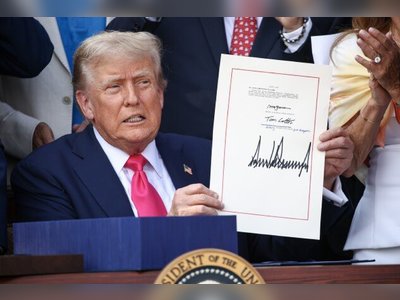
China Bans Seven U.S. Companies Due to Arms Sales to Taiwan
In response to arms sales to Taiwan and citing concerns over national sovereignty, Beijing targets US companies.
On Tuesday, the Chinese Ministry of Commerce announced that seven U.S. companies have been added to its 'Unreliable Entity List' due to their participation in arms sales to Taiwan, an act China considers a breach of its territorial integrity.
Among these companies, including Inter-Coastal Electronics, are now forbidden from exporting to or importing from China.
They are also prohibited from making new investments within China.
These measures took effect immediately after the announcement.
This action highlights Beijing’s firm opposition to what it sees as outside interference concerning Taiwan, an independently governed island that China claims as part of its territory.
This move occurs during ongoing tensions between the U.S. and China over Taiwan and other issues like trade disputes and technological rivalry.
Introduced in 2019, China's 'Unreliable Entity List' serves as a tool to penalize foreign entities perceived as threatening China's sovereignty or security.
Being on the list imposes substantial operational restrictions and emphasizes the growing challenges businesses face in navigating U.S.-China relations.
The Chinese government has repeatedly criticized U.S. arms sales to Taiwan, stating that such transactions destabilize the region and contravene the 'One China' principle, a key element of Beijing's foreign policy.
These latest sanctions serve as a clear indication of China's intent to use economic measures to address what it regards as provocations by the U.S.
The U.S. maintains that its arms sales to Taiwan align with the Taiwan Relations Act of 1979, which requires Washington to provide the island with defensive capabilities.
Taiwan views this military support as essential for maintaining its security amid mounting pressure from Beijing.
The companies targeted have not yet publicly responded to the sanctions.
As the geopolitical situation continues to evolve, this development underscores the complex and delicate nature of cross-strait relations and their effects on international trade and diplomacy.
Among these companies, including Inter-Coastal Electronics, are now forbidden from exporting to or importing from China.
They are also prohibited from making new investments within China.
These measures took effect immediately after the announcement.
This action highlights Beijing’s firm opposition to what it sees as outside interference concerning Taiwan, an independently governed island that China claims as part of its territory.
This move occurs during ongoing tensions between the U.S. and China over Taiwan and other issues like trade disputes and technological rivalry.
Introduced in 2019, China's 'Unreliable Entity List' serves as a tool to penalize foreign entities perceived as threatening China's sovereignty or security.
Being on the list imposes substantial operational restrictions and emphasizes the growing challenges businesses face in navigating U.S.-China relations.
The Chinese government has repeatedly criticized U.S. arms sales to Taiwan, stating that such transactions destabilize the region and contravene the 'One China' principle, a key element of Beijing's foreign policy.
These latest sanctions serve as a clear indication of China's intent to use economic measures to address what it regards as provocations by the U.S.
The U.S. maintains that its arms sales to Taiwan align with the Taiwan Relations Act of 1979, which requires Washington to provide the island with defensive capabilities.
Taiwan views this military support as essential for maintaining its security amid mounting pressure from Beijing.
The companies targeted have not yet publicly responded to the sanctions.
As the geopolitical situation continues to evolve, this development underscores the complex and delicate nature of cross-strait relations and their effects on international trade and diplomacy.












